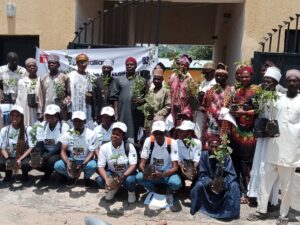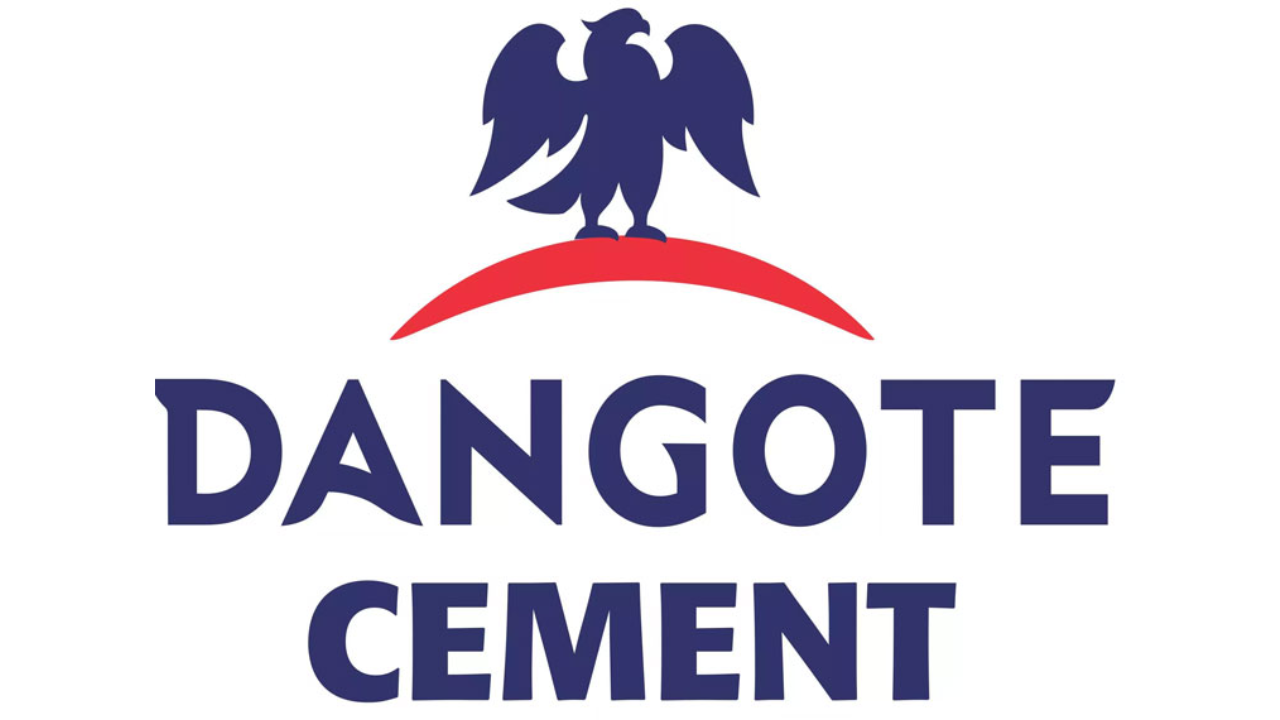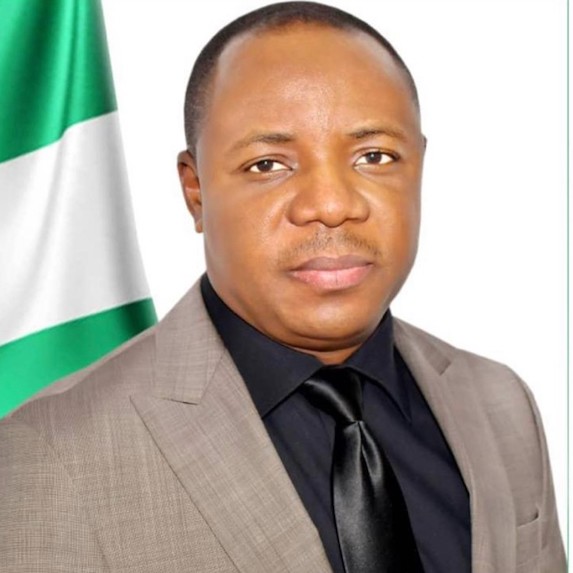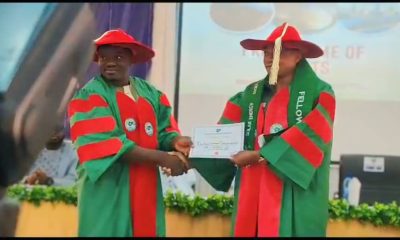Wheather and Climate
NGO plants 80 trees in Karshi to mitigate climate change

Creative Vision Development Foundation, an Abuja-based NGO has planted 80 trees in Karshi a suburb within the Federal Capital Territory (FCT) to mitigate climate change.
Mrs Funmilola Oladejo, Executive Director of the NGO said this during the tree planting exercise in the community on Tuesdays in Abuja.
“We have planted 80 trees in Karshi today to mitigate climate change within the community.
“Planting of economic trees is essential in the environment because it serves as shade, cover, food, climate change mitigation, gives cooler temperature and ensures a healthy environment amongst others.
“We will continue to collaborate with communities at the grassroots and plant more trees in secondary schools within the FCT to mitigate climate change,” she assured.
Oladejo noted that the NGO was carrying out a project called Youth Advocacy for Climate Action (YACA).
The YAGA (project) theme is; “Go green Plant a tree today save our planet”.
Jude Gagah, Programme Intern with the NGO said that the trees planting was aimed at mitigating the effects of climate change within the area.
“One of the issues affecting humans on earth is the environment due to human activities such as burning of fossil fuels, deforestation and the indiscriminate disposals of wastes within the environment ” he said.
He decried the attitude of most residents who drop their wastes in drainage lines believing that when the rains fall it would wash the wastes away, but instead these wastes block the water channels which causing flooding.
Gagah expressed displeasure over what flooding could cause in the society after such acts of indoctrinate waste disposal and called on residents to be more cautious.
Responding, Alhaji Ahmed Doka, District Head Karshi, expressed satisfaction over the tree planting gesture saying that it was a welcome development for the people of the area.
“We are having soil erosion in our community so with the planting of trees it will help us control the erosion,” he said.
He urged them to monitor the trees that they have planted to ensure survival.(NAN)
Wheather and Climate
Climate: Dangote Group reaffirms commitment to sustainability

The Dangote Group has reaffirmed commitment to environmental sustainability with enunciation of seven key pillars that underpin its operations.
The pillars are institutional, social, economic, financial, environmental, operational and cultural sustainability.
The company reaffirmed the commitment at an environmental journalism workshop in Lagos with the theme: “Reporting the Environment for Sustainability”.
Mr James Adenuga, Acting Group Head, Health, Safety, Security and Environment (HSSE) & Sustainability at Dangote Group, said that the seven key pillars centred on people, planet and profit, to mitigate climate change.
Adenuga represented by Mr Adeyemi Adun, Group Environment and Sustainability Specialist at Dangote Industries Ltd.
,spoke on the topic: “Reporting the Environment for Sustainability’’.
He said the group would remain committed to building a socially responsible and impactful business that would serve all stakeholders.
Adenuga described sustainability as development that would meet the needs of the present without compromising the ability of the future.
He said the group invested funds in environmental research yearly to drive its decision making.
He added that the group partnered the UN for training on sustainability and climate change advocacy.
“The issue of sustainability should start from the home and should not be for governments and companies only, to solve global environmental problems one after the other,” Adenuga said.
Mr Aliu Akoshile, Executive Director at Climate Africa Media Initiative & Centre (CAMIC), called on journalists to take reporting of the environment seriously because `it is binds everyone together’.
“If the environment is not conducive, there won’t be development; journalists have a lot to do in order to report fairly,” Akoshile said.
Akoshile spoke on the topic: “Journalism and Climate Change.”
He hoped that the training would encourage journalists to appreciate efforts of corporate organisations such as Dangote Group toward achieving environmental sustainability in Nigeria.
Akoshile also urged journalists to do investigative reports to address some environmental issues.
He hoped that the training would enable journalists to pay adequate attention to their environments and climate.
Akoshile urged that companies should be assessed by their contributions to the society.
He listed challenges of climate change reporting as scientific complexity and communication, limited resources and newsroom constraints, skepticism, denial and disinformation, among others.
Akoshile urged journalists to seek partnerships with non-governmental organisations and corporations in climate reporting, as well as engage local communities and indigenous voices.
He said that environmental journalism required critical thinking and interrogation of issues, adding that journalists should hold governments accountable.
A research analyst at Africa Check, Mr Allwell Okpi, urged journalists to give attention to fact-checking to avoid misinformation.
Okpi said that journalists must identify the original source of information and verify the content before publishing.
He urged journalists to be factual about names, titles, places, quotes and video clips in their stories to avoid misinformation.
“Bloggers seek online traffic, everyone who creates and shapes information has agenda,” he said.
Okpi warned journalists to avoid relying on transferred information in news reporting.
“Once there is transfer of information, there would be distortion, and journalists must avoid that,” he said.
He said that journalists must get their sources and experts to explain jargons for easy understanding.
Okpi spoke on “Fact Check and Investigative Journalism.”
The News Agency of Nigeria (NAN) reports that about 60 journalists participated in the training organised by Dangote Group in partnership with CAMIC.
Wheather and Climate
NiMet alerts Northern states on deteriorating visibility

The Nigerian Meteorological Agency (NiMet), has alerted the public on the possibility of deterioration in visibility in some northern states as a result of dust haze propagated into the country from the source region.
This is contained in a statement signed by Mr Muntari Ibrahim, NiMET’s General Manager of Public Affairs on Wednesday in Abuja.
NiMet said stations in the source region from Chad (Faya-Largeau, Bol-Berim, Mongo, Abeche and Ndjamena) have been reporting horizontal visibility between other sources from Niger that share borders with northern Nigeria.
“Diffa, Maine-Soroa, Goure, Bila, Maradi, zinder and Birni-n- Konni have been reporting dust haze in poor visibility between 1000m and 3000 m since the last 24 hours.
” Due to strong winds, the dust in suspension is expected to propagate to some states in the northern part of the country, which will further reduce horizontal visibility.
” There are prospects of dust haze (in moderate to poor horizontal visibility) over the northern parts of the country , especially over Katsina , Kano, Nguru, Jigawa Potiskum and Maiduguri in the next 24 hours”, the statement said.
NiMet advised members of the public to take necessary precautions due to dust particles presently in suspension over the atmosphere.
The agency advised Individuals with respiratory ailments to protect themselves as the current weather condition is not good for their health.
“Airline operators are also advised to avail themselves of weather reports from NiMet for effective planning in their operations.
“NiMet will continue to monitor the weather and provide updates when necessary,” it said.
COVER
COP26: Global Leaders Dump Nigeria’s $10bn Investment Target-Aduda

….Global Leaders Dump Nigeria
Permanent Secretary of the Ministry of Petroleum Resources, Gabriel Aduda, has voiced out concerns over the failure of global leaders to invest approximately 10 billion dollars in Nigeria’s net-zero and energy transition plans by 2060.
Aduda spoke at a Ministerial Roundtable at the ongoing World Petroleum Congress(WPC) on Wednesday, in Calgary, Canada, with the topic ‘What Does The Energy Transition Mean for your Country’.
He said various global leaders at the 26th UN Climate Change Conference of the Parties (COP26) in Glasgow, Scotland in 2021, made various commitments, which stood at $10billion.
According to him, this was to aid Nigeria’s agenda on commitments to attain net-zero by 2060 but with conditions.
‘‘The truth of the matter is that promises were made as to how the initial injection of 10 billion dollars was going to be done. But, l seat here to tell you that not a cent has been moved,’’ he said.
He explained that part of the conditions was that transition to renewable does not come cheap.
Aduda said,”one of the things that Nigeria is not shy to say is that ‘‘we do not have the finances to get it done.’’”
He maintained that if Nigeria was going to achieve net zero by 2060, it meant that there would be significant financial injection into the system from the country.
He noted that there would also be support across the world, especially those that were responsible for heavy emissions.
NNPC Board Chair: Buhari Replies Araraume, Raises Issue of Jurisdiction, Statute of Limitation
‘‘Now these issues were agreed to and promises were made at COP26, but how much of these promises have been fulfilled?
“The truth is that Africa still sees huge financial exclusion when it comes to the issue of climate change and we have always said it and the numbers are clear.
“In 2021, 2022, 600 billion dollars of green burns were generated but less than 0.26 per cent came to Africa.
“When we made this commitment at COP26, His Excellency, the then president, said we would need at the very beginning about 10 billion dollars with a target of 410 billion dollars till 2060,’’ he said.
According to him, a larger chunk of these funds will be used for funding of infrastructure, especially gas infrastructure across Nigeria.
The permanent secretary said that Africa remained the most compliant continent when it comes to renewable energy.
According to him, this was because the continent has been able to prove that no other continent has been close to where it is on renewables.
He maintained that out of the 54 countries in Africa, close to 30 used one form of renewable energy or the other.
He said, for instance, Kenya has 70 per cent of renewables and quite a number of other countries could also boast at least 40 per cent.
‘‘But, what we have been able to put together across all the continent. No other continent is as compliant as African is, yet, Africa is the least emitter of this hydrocarbons or contributor to this climate issues that we are dealing with.
“More importantly, what does energy transition mean to us as a country? A lot. We totally understand that we are a very rich country in natural resources and our very strength is in gas, which in Nigeria is even much more than crude deposit.
“The proven quantum of gas that we have is about 260TCF with the potential for more. Now we have identified gas in Nigeria as our transition fuel.
“We have tried to rally round in all our policies, everything we need to see that would work within a framework, that allows us to push domestic injection of gas across Nigeria and of course across Africa.
“Because we have always exported gas, NLNG, name it, and we are still working that we reach out with our deposit to other Africa countries and even beyond,’’ Aduda added. (NAN)
….Global Leaders Dump Nigeria




















